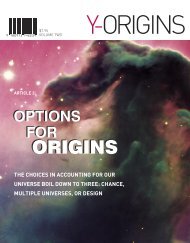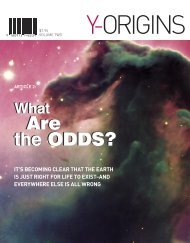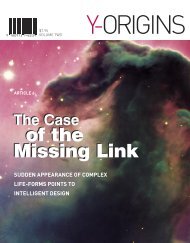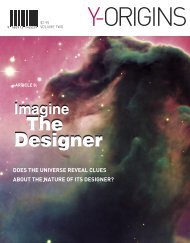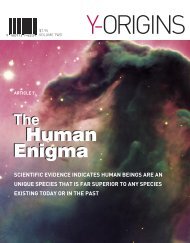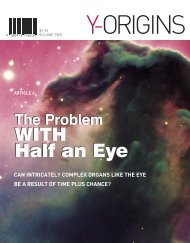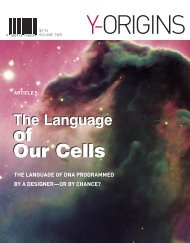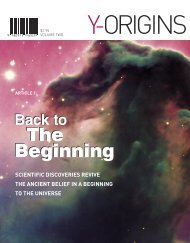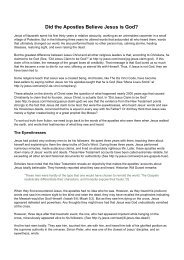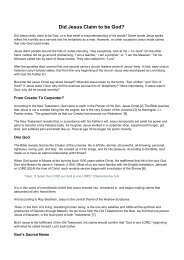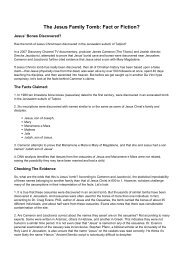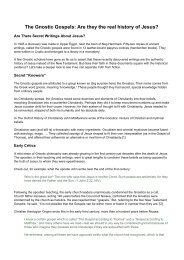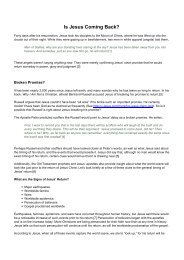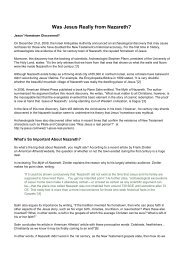1898
Create successful ePaper yourself
Turn your PDF publications into a flip-book with our unique Google optimized e-Paper software.
Perhaps the most vocal adversary of a beginning to the universe was British astronomer Sir Fred Hoyle, who<br />
sarcastically nicknamed the creation event a “big bang.” He stubbornly held to his steady state theory that the<br />
universe has always existed. So did Einstein and other scientists until the evidence for a beginning became<br />
overwhelming. The “elephant in the room” implication of a beginning is that something or Someone beyond<br />
scientific investigation must have started it all.<br />
Finally, in 1992, COBE satellite experiments proved that the universe really did have a one-time beginning in an<br />
incredible flash of light and energy. [4] Although some scientists called it the moment of creation, most preferred<br />
referring to it as the “big bang.”<br />
Astronomer Robert Jastrow tries to help us imagine how it all began. “The picture suggests the explosion of a<br />
cosmic hydrogen bomb. The instant in which the cosmic bomb exploded marked the birth of the Universe.” [5]<br />
Everything from Nothing<br />
Science is unable to tell us what or who caused the universe to begin. But some believe it clearly points to a<br />
Creator. “British theorist, Edward Milne, wrote a mathematical treatise on relativity which concluded by saying,<br />
‘As to the first cause of the Universe, in the context of expansion, that is left for the reader to insert, but our<br />
picture is incomplete without Him.’” [6]<br />
Another British scientist, Edmund Whittaker attributed the beginning of our universe to “Divine will constituting<br />
Nature from nothingness.” [7]<br />
Many scientists were struck by the parallel of a one-time creation event from nothing with the biblical creation<br />
account in Genesis 1:1. [8] Prior to this discovery, many scientists regarded the biblical account of creation from<br />
nothing as unscientific.<br />
Although he called himself an agnostic, Jastrow was compelled by the evidence to admit, “Now we see how the<br />
astronomical evidence leads to a biblical view of the origin of the world.” [9]<br />
Another agnostic, George Smoot, the Nobel Prize winning scientist in charge of the COBE experiment, also<br />
admits to the parallel. “There is no doubt that a parallel exists between the big bang as an event and the Christian<br />
notion of creation from nothing.”[10]<br />
Scientists who used to scoff at the Bible as a book of fairy tales, are now admitting that the biblical concept of<br />
creation from nothing has been right all along.<br />
Cosmologists, who specialize in the study of the universe and its origins, soon realized that a chance cosmic<br />
explosion could never bring about life any more than a nuclear bomb would—unless it was precisely engineered to<br />
do so. And that meant a designer must have planned it. They began using words like, “Super-intellect,”<br />
“Creator,” and even “Supreme Being” to describe this designer. Let’s look at why.<br />
Finely-Tuned for Life<br />
Physicists calculated that for life to exist, gravity and the other forces of nature needed to be just right or our<br />
universe couldn’t exist. Had the expansion rate been slightly weaker, gravity would have pulled all matter back<br />
into a “big crunch.”<br />
We’re not talking about merely a one or two percent reduction in the universe’s expansion rate. Stephen<br />
Hawking writes, “If the rate of expansion one second after the big bang had been smaller by even one part in a<br />
hundred thousand million million, the universe would have re-collapsed before it ever reached its present size.”<br />
[11]<br />
On the flip side, if the expansion rate had been a mere fraction greater than it was, galaxies, stars and planets



